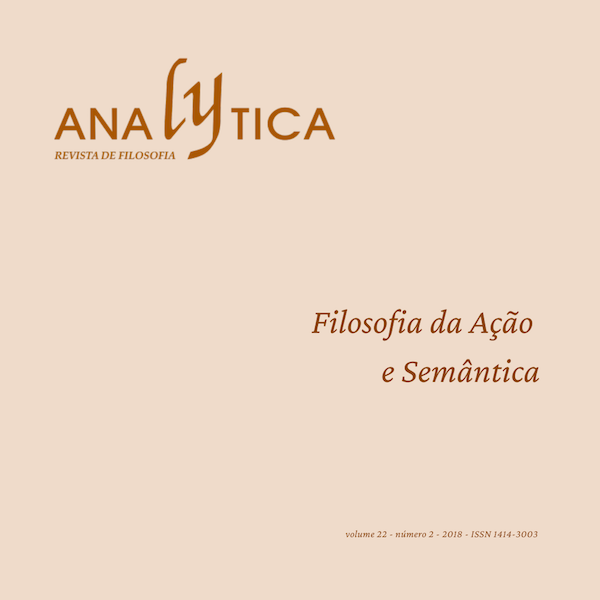O papel das idealizações na interpretação pragmatista da tradição da Teoria Crítica
DOI:
https://doi.org/10.35920/arf.2018.v22i2.28-49Palavras-chave:
discussão prática, pragmatismo kantiano, Teoria Crítica, suposições idealizadoras.Resumo
O objetivo deste artigo é analisar a interpretação pragmatista da tradição da Teoria Crítica, e o papel que as idealizações neokantianas assumem nesta interpretação. Tentaremos mostrar que, em uma interpretação pragmatista, o cerne da Teoria Crítica consiste em uma tensão argumentativa vinculada à estruturação comunicativo-discursiva típica das sociedades democráticas contemporâneas, como estruturação que confere às discussões práticas um papel primordial na dinâmica social concreta. Partindo de uma análise das diferenças entre as perspectivas antiga e moderna de compreensão da discussão prática, procuramos mostrar que, no âmbito das discussões práticas modernas ou contemporâneas, as idealizações neokantianas assumem um papel central, definido através da oposição a fatores objetivos ou objetivados, alheios à racionalidade, que admitidamente afetam tais discussões. Nesse contexto, as idealizações neokantianas se configuram como suposições idealizadoras, com as quais os participantes das discussões não podem deixar de em alguma medida se comprometer.
Abstract
The aim of this paper is to analyze the pragmatist interpretation of Critical Theory, and the role that the neo-kantians idealizations assume in this interpretation. We argue that, in the pragmatist interpretation, the core of Critical Theory is located in an argumentative tension linked to the communicative and discursive structuring typical of the contemporary democratic societies, as a structuring which gives to the practical discussions a primordial role in the concrete dynamics of society. Starting from an analysis of the differences between the ancient and the modern perspectives of comprehension of practical discussion, we argue that, in the context of the modern or contemporary practical discussions, the neo-kantians idealizations assume a key role, defined by the opposition to objective or objectified elements, which are alien to rationality, and affect such discussions. In this context, the neo-kantians idealizations take the figure of idealizing suppositions, with which the participants cannot help engaging.
Downloads
Referências
BAYNES, K. 2004. A virada transcendental: o ‘pragmatismo kantiano’ de Habermas. In RUSH, F. (ed.). Teoria Crítica. Tradução Beatriz Katinsky e Regina Andrés Rebollo. 235-262. Aparecida, SP: Ideias e Letras, 2008.
BOHMAN, J. 2001. Participants, Observers, and Critics: Practical Knowledge, Social Perspectives, and Critical Pluralism. In REHG, W. e BOHMAN, J. (eds.). Pluralism and the Pragmatic Turn; The Transformation of Critical Theory; Essays in honor of Thomas McCarthy. 87-113. Cambridge, MA: The MIT Press. https://doi.org/10.7551/mitpress/5425.003.0007
GEUSS, R. 2004. A dialética e o impulso revolucionário. In RUSH, F. (ed.). Teoria Crítica. Tradução Beatriz Katinsky e Regina Andrés Rebollo. 135-174. Aparecida, SP: Ideias e Letras.
HABERMAS, J. 2014. Conhecimento e Interesse. In Técnica e Ciência como Ideologia. Tradução de Felipe Gonçalves Silva. São Paulo: Ed. Unesp. Edição original: 1968.
HABERMAS, J. 2004. Verdade e Justificação. Tradução de Milton Camargo Mota. São Paulo: Ed. Loyola. Edição original: 1999.
HEATH, Joseph. 2001. Problems in the Theory of Ideology. In REHG, W. e BOHMAN, J. (eds.). Pluralism and the Pragmatic Turn; The Transformation of Critical Theory; Essays in honor of Thomas McCarthy. 163-190. Cambridge, Massachusetts: The MIT Press. https://doi.org/10.7551/mitpress/5425.003.0010
McCARTHY, Thomas. 1994. Philosophy and Critical Theory: A Reprise. In COUZENS Hoy, D. e McCARTHY, T. Critical Theory. 5-100. Cambridge, Massachusetts: Blackwell.
NUSSBAUM, Martha. 1993. Non-Relative Virtues: An Aristotelian Approach. In NUSSBAUM, M. e SEN, A. (eds.) The Quality of Life. 242-269. Oxford: Oxford University Press. https://doi.org/10.1093/0198287976.003.0019
NUSSBAUM, Martha. 1995. Aristotle on human nature and the foundations of ethics. In ALTHAM, J. e HARRISON, R. (eds.) World, Mind, and Ethics; Essays on the ethical philosophy of Bernard Williams. 86-131. Cambridge: Cambridge University Press. https://doi.org/10.1017/cbo9780511621086.007
RAWLS, John. 1996. Political Liberalism. Nova York: Columbia University Press.
TAYLOR, Charles. 2014. Hegel; Sistema, Método e Estrutura. Tradução de Nélio Schneider. São Paulo: É Realizações Editora. Edição original: 1975.
Downloads
Publicado
Como Citar
Edição
Seção
Licença
Os autores que publicam nesta revista concordam com os seguintes termos:
- Os autores mantêm os direitos autorais e concedem à revista o direito de primeira publicação, com o trabalho simultaneamente licenciado sob a Licença Creative Commons Atribuição-SemDerivações 4.0 Internacional (CC BY-ND 4.0), que permite a redistribuição, comercial ou não comercial, desde que a obra original não seja modificada e que seja atribuído o crédito ao autor.
- Os autores têm autorização para assumir contratos adicionais separadamente para distribuição não-exclusiva da versão do trabalho publicada nesta revista (ex.: publicar em repositório institucional ou como capítulo de livro), com reconhecimento de autoria e publicação inicial nesta revista.
- Os autores têm permissão e são estimulados a publicar e distribuir seu trabalho online (ex.: em repositórios institucionais ou na sua página pessoal) a qualquer ponto antes ou durante o processo editorial, já que isso pode gerar alterações produtivas, bem como aumentar o impacto e a citação do trabalho publicado (Veja O Efeito do Acesso Livre).






